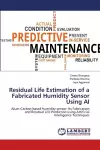
Residual Life Estimation of a Fabricated Humidity Sensor Using AI
3 authors - Paperback
£29.82
Cherry Bhargava is currently working as an associate professor and head, school of electrical and electronics engineering at Lovely Professional University, Punjab, India. She has more than fourteen years of teaching and research experience. She has published research papers in journals of national and international repute. She has seven books related to reliability, artificial intelligence and digital electronics to her credit. She has registered three copyrights and filed two patents. She is a recipient of various national and international awards for being outstanding faculty in engineering and excellent researcher. She is an active reviewer and editorial member of various prominent SCI and Scopus indexed journals. She is a lifetime member of IET, IAENG, NSPE, IAOP, WASET, and reliability research group. Her area of expertise includes the reliability of electronic systems, digital electronics, VLSI design, artificial intelligence, and related technologies.
Amit Sachdeva is presently working as an associate professor at Lovely Professional University, Punjab, India. He has more than seven years of teaching and research experience. He has published twenty technical research papers in SCI, Scopus indexed quality journals and national/international conferences. He has book chapters related to nanotechnology and nanomaterials to his credit. He is a recipient of the Young Scientist Award by Centre of Ionics, University of Malaya. He is a life member of IAENG and ISC. He is an editorial board member, session chair and reviewer of various journals and conferences. His area of expertise includes nanocomposites, solar cells, sensors, carbon nanotubes, and associated fields.
Pradeep Kumar Sharma is presently working as an associate professor, school of pharmaceutical sciences, Lovely Professional University, Punjab, India. He has more than thirteen years of teaching and research experience. He has published technical research papers in SCI, Scopus indexed quality journals and national/international conferences. His areas of research include computer-aided drug design using artificial intelligence, pharmaceutical validation using artificial intelligence, brain tumor detection using artificial intelligence and intelligent medicine development for the treatment of renal dysfunction. He has taught courses including organic synthesis, medicinal chemistry and pharmaceutical analysis at undergraduate and graduate level."